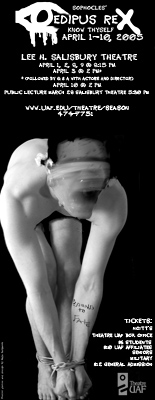 |
For tickets or production information: We are located at 302 Great Hall on UAF's main campus |
The Tragic Flaw |
 |
 |
For tickets or production information: We are located at 302 Great Hall on UAF's main campus |
The Tragic Flaw |
 |
 OEDIPUS REX by Sophocles
OEDIPUS REX by Sophocles